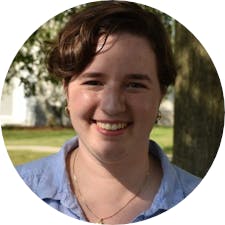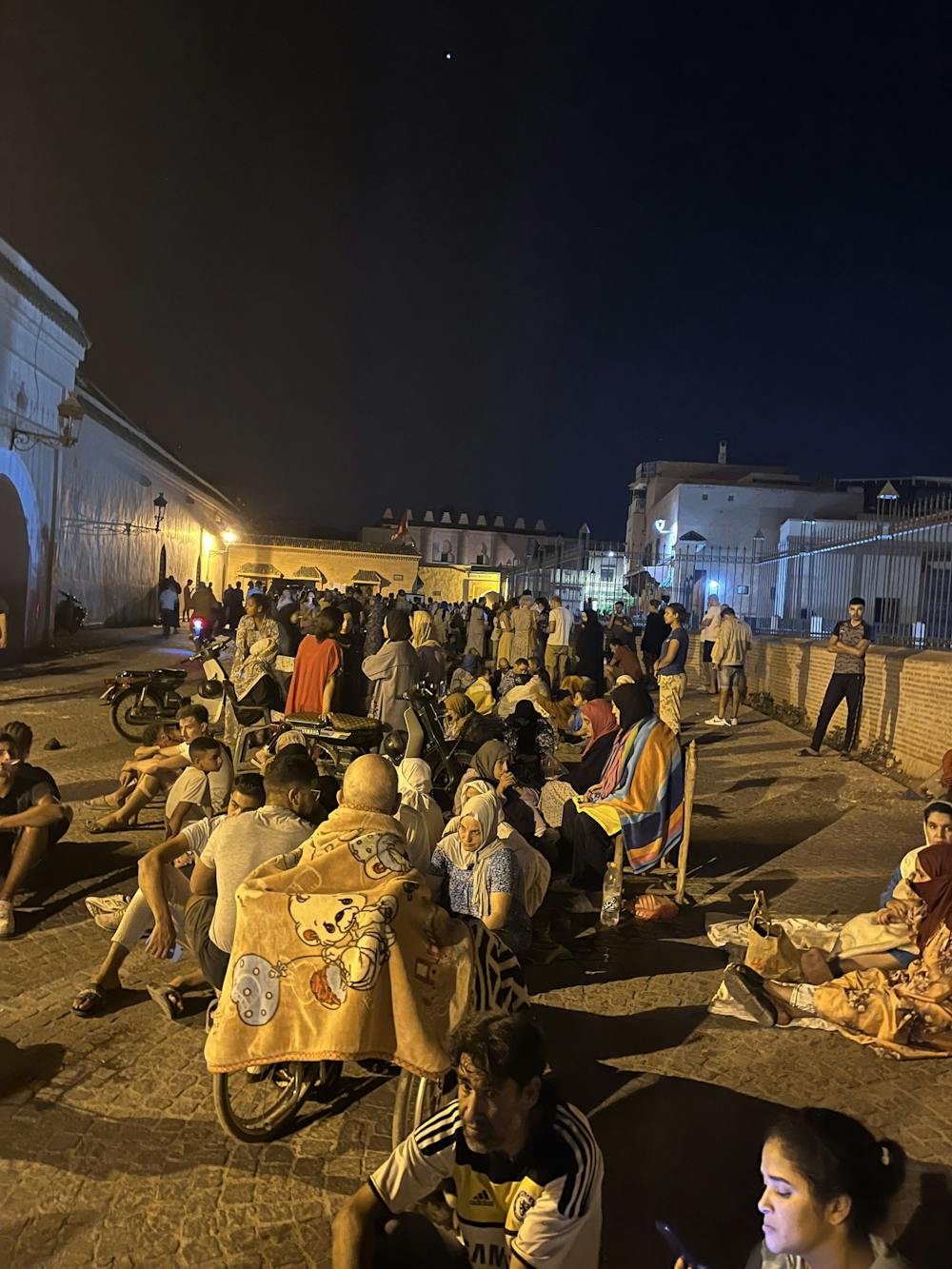After thirty minutes of vicious shaking, the world once again stood still, save for the giant cloud of dust rising story by story to envelop the city. Then the screaming started.
Beck Orten ’27.5 clung desperately to her friend, surrounded by glass shards from the shattered light bulbs that once adorned the terrace overhang where she had been admiring the lights over the city of Marrakech, Morocco before the earthquake hit at 11:11 p.m. on Sept. 8.
The 6.8-magnitude earthquake caused more than 2,900 deaths and 5,500 casualties, according to the Moroccan Interior Ministry. Its epicenter was in the High Atlas mountains, just 72 miles southwest of Marrakech, where Orten was visiting.
Morocco lies on the Northwest coast of Africa, adjoining the Atlantic and the Mediterranean. Marrakech is one of its most famous cities, with the UNESCO World Heritage Site of Marrakech’s medina, or old city, drawing millions of tourists from around the world each year.
Orten arrived on Sept. 9 with a group of friends, hoping to explore the city on a break from her job teaching English in Casablanca, Morocco as part of her gap semester before she arrives at Middlebury this February.
After a day of exploring Marrakech, Orten was relaxing on the terrace with her friend when the quake began.
Paralyzed by the sounds of screams below, they remained huddled together on the roof until the city quieted and they headed for the stairs. But the dust hanging thickly in the air soon forced them back as they struggled to breathe. They returned to the terrace, unaware of the six-foot crack snaking up the side of the building that supported the overhang.
The lights, internet and cellphone signal had all gone out, leaving them with no way of reaching their friends in the hostel below. After waiting as long as they felt they could, they braved the stairs once more and emerged onto the street unharmed but for the dust they had inhaled.
They found the rest of their group shortly, along with seemingly every other inhabitant of the city as native Moroccans and tourists alike fled their homes and hotels.
One of Orten’s friends stumbled out of the crumbling building without shoes, joining others in the streets in various states of disarray — a Moroccan man clad only in his underwear next to a tourist fresh from the shower, gripping a towel close to her body. The routine social norms of modest dress seemed to have broken down completely as women wearing full-body niqabs mingled with those in their bathrobes.
Orten and her friends followed the crowd around them, which slowly picked its way towards the closest mosque. People trickled into the square in front of the mosque and filled the courtyard within, settling for a long night ahead.
Despite none of the group speaking Arabic and no one else speaking English, the Moroccans around Orten’s group offered them aid as she and her friends tried to help other people in the square themselves.
The motorcyclists that typically zip through the crowded walkways of Marrakech, narrowly missing pedestrians, wove through the crowd, handing out thick woolen blankets to ward off the 45-degree chill. Only four of Orten’s group of six could fit under the blanket the motorcyclists gave them at one time, so they rotated out and supplemented their meager supplies by using a towel as a covering and a water bottle as a pillow.
One woman began to have an asthma attack in reaction to the thick dust still hanging in the air and coating every surface. In her hurried escape, she had left her inhaler at home and began to panic in its absence. Orten’s friend coached her through calming exercises until her breathing regulated.
It wasn’t until 2 a.m., three hours after the earthquake hit, that cell service was restored to the area. For the first time, Orten began to grasp the magnitude of the earthquake as she read about the rising death toll.
The intensity of the night and biting cold kept Orten awake until the dawn call to prayer heralded the daybreak as if it were any other morning. The call seemed to echo through the silent city as each mosque broadcasted it from the remaining minaret towers.
Orten skirted the rubble and the people still sleeping in the courtyard, her exhaustion muting the loud calls of “Allahu akbar,”a common phrase in Muslim prayer, to wash the dust off of her hands as part of her adulations before heading to the prayer room.
“The imam’s voice shook as he recited the prayer. If he was crying or breathless, it was impossible to tell… Faith alone seemed to hold the building up,” Orten said. “It was the most human I’d ever felt, kneeling barefoot on a dirty carpet praying in a language I barely understood.”
The early morning light revealed rubble-covered streets, collapsed terraces and parts of buildings blocking the city’s famous alleyways. Despite the crack running up the side of the hostel, Orten’s group decided it seemed structurally sound enough for them to enter and grab their belongings.
The group picked through the rubble, carrying their suitcases and exhausted bodies towards the bus station on the edge of the medina.
Despite the destruction, many people seemed to wake up to perform their jobs as usual. Uniformed trash collectors navigated around the crumbled sides of buildings to pick up discarded cigarette butts, and motorcycles arrived pulling carts of fruits and vegetables to sell at the market. As Orten and her friends waited for their bus home, a man tried to sell them day trips to the Sahara desert from a binder full of options.
Deciding that the vacation had yielded enough excitement already, Orten stayed on the bus as it pulled away and began the four-hour trip north to Casablanca. After surviving a natural disaster, navigating its aftermath and remaining awake for more than 24-hours through cold and uncertainty, at last, Orten slept.

Sophia McDermott-Hughes ’23.5 (they/them) is an editor at large.
They previously served as a news editor and senior news writer.
McDermott-Hughes is a joint Arabic and anthropology and Arabic major.
Over the summer, they worked as a general assignment reporter at Morocco World News, the main English-language paper in Morocco.
In the summer of 2021 they reported for statewide digital newspaper VTDigger, focusing on issues relating to migrant workers and immigration.
In 2018 and 2019, McDermott-Hughes worked as a reporter on the Since Parkland Project, a partnership with the Trace and the Miami Herald, which chronicled the lives of the more than 1,200 children killed by gun violence in the United States in the year since the Marjory Stoneman Douglas High School shooting in Florida.




